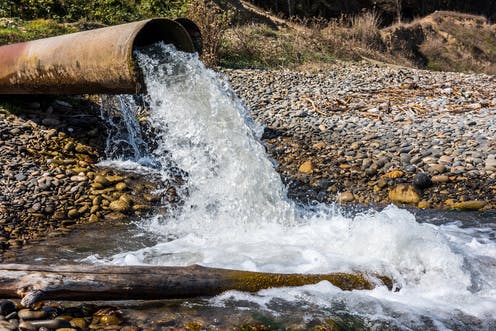The UK has around 1,500 individual river systems, totalling over 200,000km in length. It’s common for sewers here to accept both untreated human waste and rain water in a combined system. Water and sewerage companies are permitted to release this wastewater into inland and coastal waters without treatment under exceptional conditions, such as following heavy rainfall.
Environment Agency figures, mapped by The Rivers Trust, show that there were more than 400,000 untreated discharges in 2020, lasting a total of 300 million hours. Stormwater overflows act as pressure relief valves, preventing large volumes of mixed human waste and stormwater from overwhelming the system and backing up into homes and businesses during downpours.
Numerous high-profile sewage pollution events have focused public attention on the activities of water and sewerage companies, which under existing law are required to report any sewage releases they lack permits for to the regulator – the Environment Agency in England and Wales.
Our recent analysis of pollution incident data from every water and sewerage company in England sheds light on the failings of this approach. We found that, while various companies have very different records on pollution, pollution incidents have been on an upward trend since 2018.
As much as 5% of pollution incidents from sewage treatment works and pumping stations could be going unreported. The results also indicated that pollution events which aren’t reported promptly by a company are likely to cause more severe damage to the environment.
Streaks on the surface of the river betray the presence of pollution. Sarah Purnell, Author provided
The UK government recently amended legislation to oblige water and sewerage companies to progressively reduce damage to rivers and waterways from sewer overflows. This means the water industry will be required by law to show it has reduced the amount of untreated wastewater being released into waterways over the next five years. But by leaving it up to private companies to disclose their wrongdoing, the government is unlikely to make much progress.
Cracking down on pollution
The nine water and sewerage companies operating in England reported 1,730 pollution incidents in 2019. Non-company sources, which includes the public, reported a further 462. Another recent study suggested that water and sewerage companies have been under-reporting pollution incidents since at least 2009.
Inadequate and inconsistent reporting by water and sewerage companies makes it difficult to get an accurate understanding of how much sewage pollution there really is. The government’s reluctance to toughen the protection of inland and coastal waters is particularly worrying at a time when more and more people are enjoying open-water swimming.
Wastewater releases when water flow is low, such as during dry weather, can be particularly damaging to ecosystems and bathers. This is when waters are likely to contain more disease-causing microbes, such as norovirus.
More extreme weather as a result of climate change will ramp up the strain on Britain’s ageing sewers. That will make it difficult enough reducing approved stormwater discharges. Illicit pollution incidents must be stopped entirely where possible.
Standardising the process for reporting pollution could make this process easier. In the long-term, Britain should change its combined sewerage system to one in which wastewater and stormwater are collected and dealt with separately. In the meantime, improving natural flood management by regenerating wetlands and removing surfaces like concrete where possible could also help.



 Stuck in a creativity slump at work? Here are some surprising ways to get your spark back
Stuck in a creativity slump at work? Here are some surprising ways to get your spark back  Why have so few atrocities ever been recognised as genocide?
Why have so few atrocities ever been recognised as genocide?  Parents abused by their children often suffer in silence – specialist therapy is helping them find a voice
Parents abused by their children often suffer in silence – specialist therapy is helping them find a voice  Office design isn’t keeping up with post-COVID work styles - here’s what workers really want
Office design isn’t keeping up with post-COVID work styles - here’s what workers really want  Locked up then locked out: how NZ’s bank rules make life for ex-prisoners even harder
Locked up then locked out: how NZ’s bank rules make life for ex-prisoners even harder  Yes, government influences wages – but not just in the way you might think
Yes, government influences wages – but not just in the way you might think  What’s the difference between baking powder and baking soda? It’s subtle, but significant
What’s the difference between baking powder and baking soda? It’s subtle, but significant  Debate over H-1B visas shines spotlight on US tech worker shortages
Debate over H-1B visas shines spotlight on US tech worker shortages  Why financial hardship is more likely if you’re disabled or sick
Why financial hardship is more likely if you’re disabled or sick  Britain has almost 1 million young people not in work or education – here’s what evidence shows can change that
Britain has almost 1 million young people not in work or education – here’s what evidence shows can change that  Canada’s local food system faces major roadblocks without urgent policy changes
Canada’s local food system faces major roadblocks without urgent policy changes  6 simple questions to tell if a ‘finfluencer’ is more flash than cash
6 simple questions to tell if a ‘finfluencer’ is more flash than cash  Columbia Student Mahmoud Khalil Fights Arrest as Deportation Case Moves to New Jersey
Columbia Student Mahmoud Khalil Fights Arrest as Deportation Case Moves to New Jersey  The Beauty Beneath the Expressway: A Journey from Self to Service
The Beauty Beneath the Expressway: A Journey from Self to Service 


































